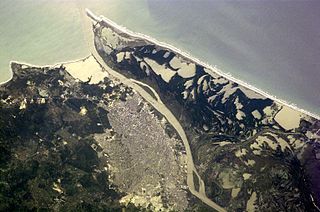This article is being considered for deletion in accordance with Wikipedia's deletion policy. Please share your thoughts on the matter at this article's deletion discussion page. |
Colombian Uruguayans are people born in Colombia who live in Uruguay, or Uruguayan-born people of Colombian descent.
There are few Colombian-born persons living in Uruguay, for a number of reasons. Both countries share the a common language- Spanish; they also have a common historical origin as part of the Spanish Empire. Uruguay is a small, peaceful country, with wide beaches on the Atlantic Ocean and various tourist destinations. Thus, some wealthy Colombians choose Uruguay as their holiday destination. Some even set their permanent residence in Uruguay. Other Colombians with economical hardship come to Uruguay in search of job opportunities, along with other Latin Americans coming to Uruguay for the same reason. [1] And there is also an inflow of Colombian refugees who flee from guerrilla fighting and drug trafficking. [2]
The 2011 Uruguayan census revealed 749 people who had declared Colombia as their country of birth. [3] In 2013, there were just 93 Colombian citizens registered with the Uruguayan social security. [4]

The Basque diaspora is the name given to describe people of Basque origin living outside their traditional homeland on the borders between Spain and France. Many Basques have left the Basque Country for other parts of the globe for economic and political reasons, with substantial populations in Colombia, Argentina and Uruguay with those of Basque ancestry in the hundreds of thousands; Peru, Venezuela, Guatemala and Chile, Canada, and the United States.

Colombians are people identified with the country of Colombia. This connection may be residential, legal, historical or cultural. For most Colombians, several of these connections exist and are collectively the source of their being Colombian.

Immigration to Spain increased significantly in the beginning of the 21st century. In 1998, immigrants accounted for 1.6% of the population, and by 2009, that number had jumped to above 12% — one of the highest in Europe at the time. Until 2014, the numbers were decreasing due to the economic crisis, but since then, immigration to Spain has increased again since 2015.
Emigration from Colombia is a migratory phenomenon that started in the early 20th century.

Immigration to Colombia during the early 19th and late 20th Century, What makes it one of the most diverse countries in the world, above other countries in the Latin region. Colombia inherited from the Spanish Empire harsh rules against immigration, first in the Viceroyalty of New Granada and later in the Colombian Republic. The Constituent Assembly of Colombia and the subsequent reforms to the national constitution were much more open to the immigrants and the economic aperture. However naturalization of foreigners, with the exception of those children of Colombians born abroad, is still difficult to acquire due to paperwork and bureaucracy. Immigration in Colombia is managed by the "Migración Colombia" agency.
Chinese Uruguayans are Uruguayan citizens of Chinese ancestry or are Chinese people residing in Uruguay.
Peruvian Uruguayans are mostly Peruvian-born persons living in Uruguay. There are as well some Uruguayan-born persons of Peruvian descent.

Immigration to Uruguay started with the arrival of Spanish settlers during the Colonial Period to what was then known as Banda Oriental. The immigration to Uruguay is very similar, if not the same, towards the Immigration to Argentina. Throughout history, Uruguay is known to gain massive waves of immigration all around the world, specifically European immigration, where today 90–95% of the Uruguayan population contains a European background. The climax of these immigration movements occurred between the last third of the 19th century and World War II, where the whole European continent was in a very unsettling position. The most highlighted group of immigrants in Uruguay are the Spaniards and Italians, both establishing the backbone of modern day Uruguayan culture and society.
Argentine Uruguayans are people born in Argentina who live in Uruguay. In 2010, there were over 10,000 Argentines living in Uruguayan territory.

Brazilian Uruguayans are people born in Brazil who live in Uruguay, or Uruguayan-born people of Brazilian descent.
Uruguayan Mexicans are people born in Uruguay who live in Mexico, or Mexico-born people of Uruguayan descent.
Paraguayan Uruguayans are people born in Paraguay who live in Uruguay, or Uruguayan-born people of Paraguayan descent.

The Venezuelan migration and refugee crisis, the largest recorded refugee crisis in the Americas, refers to the emigration of millions of Venezuelans from their native country during the presidencies of Hugo Chávez and Nicolás Maduro because of the Bolivarian Revolution. The revolution was an attempt by Chávez and later Maduro to establish a cultural and political hegemony, which culminated in the crisis in Bolivarian Venezuela. The resulting refugee crisis has been compared to those faced by Cuban exiles, Syrian refugees and those affected by the European migrant crisis. The Bolivarian government has denied any migratory crisis, stating that the United Nations and others are attempting to justify foreign intervention within Venezuela.
Chilean Uruguayans are people born in Chile who live in Uruguay, or Uruguayan-born people of Chilean descent.
Cuban Uruguayans are people born in Cuba who live in Uruguay, or Uruguayan-born people of Cuban descent. As of 2019, there were 24,485 Cubans living in Uruguay.
Mexican immigration to Uruguay comprises people born in Mexico and who live in Uruguay, or Uruguayan-born people of Mexican descent.
Dominican Uruguayans are people born in the Dominican Republic who live in Uruguay, or Uruguayan-born people of Dominican descent.
Bolivian Uruguayans are people born in Bolivia who live in Uruguay or Uruguay-born people of Bolivian descent.
Ecuadorian Uruguayans are people born in Ecuador who live in Uruguay, or Uruguayan-born people of Ecuadorian descent.
Venezuelan Uruguayans are people born in Venezuela who live in Uruguay, or Uruguayan-born people of Venezuelan descent.